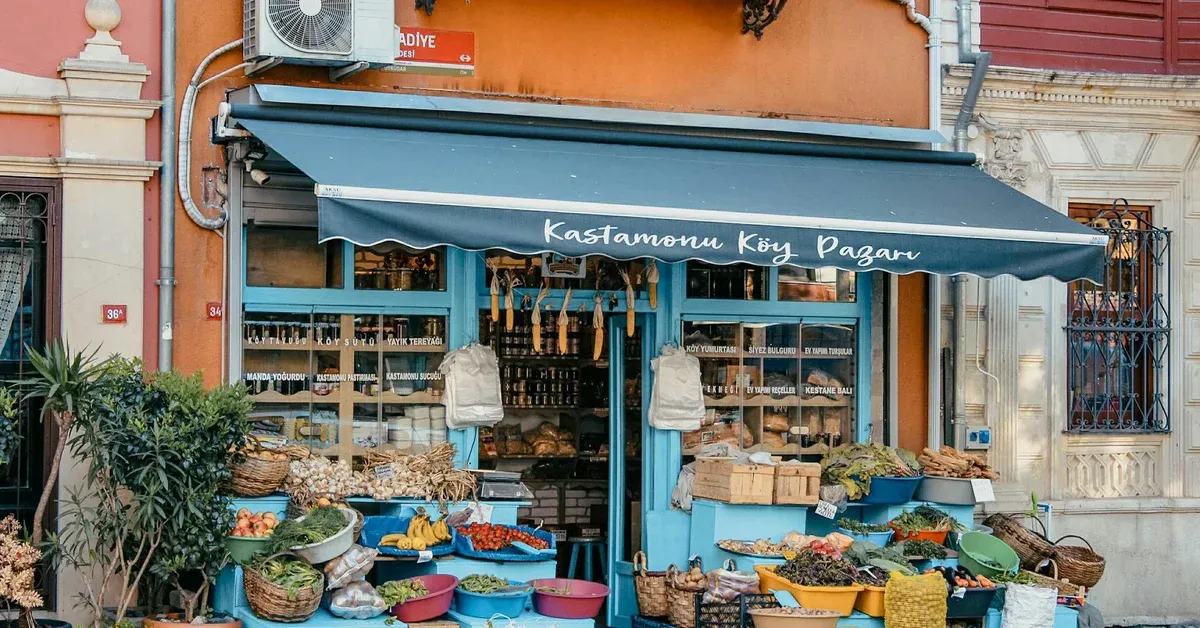
While the West obsesses over high-tech sustainable packaging and eco-friendly startups, Turkey has been running packaging-free markets for centuries. This isn’t about fancy innovations. It’s about time-tested wisdom and daily practices that make our modern zero-waste attempts look amateur. Turkey’s approach offers real lessons for a world drowning in plastic waste.
The Original Bulk Shopping Experience
Walk into any traditional Turkish market, like Istanbul’s busy Bakırköy Bazaar, and you’ll see how packaging-free shopping really works. Fresh produce sits in towering piles, spices pour from open sacks, and dried fruits wait to be scooped. Buying in bulk isn’t trendy here. It’s just how things work. Shoppers bring their own bags, jars, and baskets to fill directly from vendors. For generations, unpackaged food meant fresh and local, while packaged items seemed suspicious or imported.
This system cuts plastic waste at the source. You see, smell, and often taste your food before buying. It creates a real connection to what you eat that modern supermarkets can’t match. Turkey’s approach to eco-friendly commerce developed naturally over time, showing what sustainable shopping really looks like.
How Culture Creates Real Sustainability
Turkey’s zero-waste success comes from culture, not marketing campaigns. It’s built into daily routines, family habits, and community life. Buying “open air” from local markets is simply how households have operated for generations. People value freshness and community interaction over convenience and throwaway packaging. This cultural sustainability uses inherited wisdom for efficient resource use and less waste. While global movements search for new solutions, Turkey offers a blueprint based on what actually works.
Culture gets support from policy too. Over eight years, Turkey’s national Zero Waste program has introduced waste systems in over 205,000 buildings. This initiative, supported by the UN, shows how modern policy can strengthen traditional practices instead of replacing them.
Smart Rules and Everyday Solutions
Modern regulations are improving Turkey’s zero-waste system. Banning free plastic bags pushed more people toward reusable options. Now packaging in Turkish markets must contain recycled materials, as detailed in a Synopsis on Plastics in Türkiye by the UNDP. These policy changes work with existing habits instead of fighting them.
This system works because it’s resilient. It doesn’t depend on one piece of fancy technology. Instead, it relies on networks of small vendors and informed shoppers. Health concerns about open-air markets get handled through fast turnover of fresh produce and focus on unprocessed foods. This different approach to food safety shows an alternative to heavily packaged Western options. Turkey’s packaging-free shopping combines tradition with smart rules to create a strong environmental model.
What the World Can Learn
What can a tech-obsessed world learn from Turkey’s packaging-free markets? A lot. Not every environmental solution needs a complex app, new materials, or startup funding. Sometimes the best “tech” is continuing proven human behavior, community systems, and economic common sense. We’re talking about basic market design, consumer habits built over decades, and shared understanding of resource value. This low-tech sustainability contrasts sharply with our current problems, where microplastics are getting into medical IV bags, showing how badly we need systemic change.
Turkey’s traditional model teaches us that zero-waste isn’t some future dream. It’s happening right now, if we look beyond our tech obsession. It matches the wisdom in grandma’s zero-waste secrets, proving that old ways often work better for sustainable living. By studying places like Turkey, we learn how everyday choices, guided by tradition and supported by smart policy, can create a more sustainable and less wasteful future.